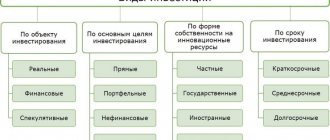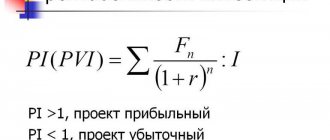Mention conservative investing and people will think of investing in the largest, most stable, most risk-averse businesses and assets, which in turn ensures the safety of the principal (if the invested capital also appreciates in value, that's better). While it is true that some industries (such as electric utilities) are defined as conservative, simply buying large, well-known companies does not meet the goal of a successful conservative investment approach. On the contrary, this view increases the confusion between conservative behavior and conventional behavior.
What is a Conservative Investor?
This is the name given to people who want to invest money in derivatives, but are not willing to bear significant risk. An axiom of the stock market is that past performance does not guarantee future returns.
It seems that the conservative investor has few options for reliable investment of money. This is wrong. Only two instruments for passive investments immediately come to mind - bank deposits and real estate.
In fact, there are many more of them, for example:
- securities of blue chips of Russian companies;
- federal loan bonds and municipal promissory notes;
- precious metals;
- ETF funds.
And here you can minimize risks if you understand when and why to buy certain asset classes.
What is a Conservative Investor?
Classification of investors by experience
Based on experience, investors are divided into professional and non-professional.
Professional
In Russia there is the status of a “professional” (or qualified) investor, which can be obtained, for example, through a broker.
Such an investor has legislative permission for any type of investment and purchase of any securities , including over-the-counter instruments (structured notes, Eurobond lots, etc.). Without this status, an investor on the stock market can only trade assets listed on the Moscow and St. Petersburg exchanges.
To obtain this status, one of the following conditions must be met:
- ownership of property for a certain amount,
- experience working in an organization that deals with securities,
- certificate of auditor, financial market specialist,
- Experience in transactions with securities for a certain amount over a year.
But the professionalism of an investor is determined not only by his official status, but by his experience and real achievements. A professional investor is one for whom investing is not a hobby, but a job (often the main or even the only one), who consistently receives a high income from his investment activities, and who knows how to professionally analyze investment instruments.
They often open their own investment funds and accept money for trust management. Such an investor becomes a manager. Usually this is an individual entrepreneur or legal entity. a person or individual entrepreneur who works on a paid basis. It is assumed that this investor has enough knowledge and experience, and perfectly understands the laws of the market - after all, he is risking not his own, but other people’s money. The activities of such managers are regulated by law.
Among professional investors, there are also speculators who make money in short periods on the difference between the purchase and sale prices (bought cheaper, sold more expensive). Such investors make transactions more often than others.
Unprofessional
Non-professional investors are amateurs who want to “put money to work instead of themselves” and earn more than can be done with a bank deposit. Most investors do not do this professionally - they are simply looking for ways to profitably “park” their savings in their free time from their main job. They can do it themselves or not.
Independent investors prefer to manage their money themselves - only they make decisions about the methods and amount of investments and bear all the risks themselves. Most often they choose long-term investments and do not make many transactions.
Non-self-directed investors typically do not have enough time or knowledge to invest on their own. For this reason, they prefer to transfer money to third parties for management .
Deposits and real estate: is everything so smooth in these instruments for a passive investor?
In the 90s of the last century, only a select few knew about the stock market. The standard products of any bank were deposits and loans. The bank accepts money from you for a certain percentage and gives it to another borrower to buy a conditional car. And he makes money from it. It all depends on the inflation rate, if the interest rate on a deposit is 5.5%, and the inflation rate is 6.5%, your money evaporates.
This is especially noticeable in 2021, when deposit rates fell to 3-3.5%. Yes, the deposit has one concrete plus; if your money is in Sberbank, you don’t have to worry, this bank has a reliable BBB credit rating. And if you deposited your hard-earned money in an unknown “Nyash-Myash” bank, and if this amount is more than 1.4 million rubles, you risk no less than a seasoned speculator.
If the license of Nyash-Myash Bank is revoked, the Deposit Insurance Agency (DIA) will, by law, return an amount of up to 1.4 million rubles. You will have to win everything else through the court and it is not a fact that you will be lucky in this matter.
Advantages of bank deposits:
- Reliability. Low risk of losing your deposit.
- Stable interest rates that you receive regularly.
- Insurance. If the bank fails, the government will cover your losses.
- Compound interest. Possibility to increase deposit income.
Disadvantages of bank deposits:
- Loss of interest if the deposit is closed early.
- Inflation risks. If prices rise, then you are losing, not saving.
- In 2021, if the total amount of deposits exceeds 1.5 million rubles, you will have to pay tax.
Now let's look at the second “reliable” instrument for a conservative investor - real estate. It would seem that there are no risks at all in purchasing an apartment for subsequent rental. Invested - bought - rented out - receive passive income.
It is important to understand that real estate is different. There is a big difference between renting out a one-room apartment in the center of Moscow or a one-room apartment on the outskirts of Uryupinsk. Expectations and returns may vary.
A bunch of other questions immediately arise here. Was the apartment purchased with a mortgage or for cash, in what region is the property located, at what price is it being rented out. There are also legal issues. According to the law, you must conclude an agreement with the tenant and pay taxes on the income.
Pros of investing in real estate:
- Stable income from renting out an apartment.
- The opportunity to sell an asset at a profit; housing prices rise over time.
Disadvantages of investing in long-term construction:
- High entry threshold. Housing prices start from 1 million rubles.
- Household risks. Fires, sewerage breaks, property damage.
- Risks of downtime. It happens that tenants do not stay long.
- Taxes on rental housing. If you don't pay them, you can get a large fine.
As you can see, deposits and real estate have pitfalls, which we have now talked about.
Deposits and real estate: is everything so smooth in these instruments for a passive investor?
Three types of investments: aggressive, conservative and moderate
There are three types of investments: aggressive, conservative and moderate.
Conservative investments guarantee you almost 100% safety of your capital and, in some cases, even a small percentage of income. Such investments are considered risk-free. These include: bank deposits, insurance savings programs, pension capital accumulation products, bonds of the state and some large issuers, usually in which the share of state participation is high, real estate. In fact, each of these instruments guarantees you the safety of your funds, and even a slight increase in it.
So, under insurance programs, you are guaranteed from 3% to 5% growth in your income, possibly more, but you are guaranteed 3–5 for sure. This is because insurance companies have very conservative investment policies. In general, everything about deposits is transparent and understandable. Initially, when concluding a contract, you know your profitability and know what amount you will receive at the exit. At the same time, the state guarantees the return of deposits in the amount of 700,000 rubles if something happens to your bank.
The management of citizens' pension funds is controlled by the state and you can trust that the regulatory authorities will not allow management companies to lose your pension capital.
The disadvantage of conservative investing is its low profitability, which is offset by a big advantage - a guarantee of capital safety.
In aggressive investing . There is a very high risk of losing part or even all of your capital. The volatility of such instruments is very high. But the profitability of such instruments, as a rule, turns out to be quite significant.
Such instruments include securities - shares, bonds of small, medium and some large companies, and derivatives - futures and options, PAMM accounts.
Mutual funds of shares can also be called aggressive, especially shares of small and medium-sized enterprises - the so-called second-tier shares, and industry mutual funds.
Moderate investing is somewhere between aggressive and conservative investment vehicles. The return on such investments is usually higher than on conservative ones. It can reach the profitability of aggressive instruments, but their risk is also much higher than conservative ones. And as aggressive ones, there is the possibility of losses.
Such investments include mutual funds of mixed investments, where the name itself indicates that the investment policy of this mutual fund contains both aggressive and conservative instruments.
Bonds of large issuers and mutual funds of bonds of non-state companies. As a rule, such bonds have a bond yield that exceeds the similar yield of government bonds over the same period of time. The selection of this type of bond is associated with an assessment of the issuer’s solvency, so as not to be among the losing investors in the event of the issuer’s bankruptcy. Also shares of the largest companies, the likelihood of bankruptcy in the foreseeable future is unlikely.
PAMM accounts in which you have distributed and minimized risks.
Remember: the greater the guarantee, the more reliable the financial product or the person offering it, the lower the interest income will be.
Accordingly, the fewer guarantees, the higher the income.
What type of investment would you choose? And why? Please share your opinion!
source
If you liked the article, share it with your friends!
Stock
The most realistic and risky way to make money for a conservative investor. And here, if you follow the recommendations, you can increase your capital. Buy blue chip stocks. These are companies with the largest capitalization, which are included in the top short list of the Moscow Exchange.
“Blue chips” on the Moscow Exchange:
- Sberbank;
- Gazprom;
- Lukoil;
- Nornickel;
- MTS;
- Rosneft;
- Novatek;
- Pole;
- RusHydro;
- VTB;
- Alrosa;
- Aeroflot.
And this is not a complete list. Buy shares of these companies in equal shares and reinvest the dividends. Maintain diversification and don’t “put your eggs in one basket.” For example: If you bought Yandex shares in 2021, you would now receive a return on these securities of 250% per annum.
The risks of investing in blue chip stocks can be reduced by buying different companies and rebalancing your portfolio.
Stock
Types of investors, what are they?
Investor type is a characteristic of an investor that shapes his behavior. Investor behavior is formed by a combination of several factors. For example, risk appetite, profitability requirements, investment horizon, subjective view of a particular investment instrument, a specific company, industry, country, etc. In general, as you can see, there are a large number of factors on the basis of which investor behavior is formed. So, let's look at what types of investors exist. Investors can be classified according to the following factors:
- Risk appetite/return requirements
- Duration of investment activities
- Type of investment strategy used
- Level of financial literacy
Bonds
Debt securities have always been a good alternative to a deposit. Now on the stock exchange you can collect a reliable pool of OFZ (federal loan bonds) and municipal securities. “OFZ” are government bonds; now their yield is at the level of 5% per annum. If you don’t want to lend to the Ministry of Finance, take municipal papers.
The most profitable receipts are bonds of the Moscow region, Krasnodar region and St. Petersburg. You can lend to states from the Customs Union; now there are bonds of Belarus and Kazakhstan on the stock exchange.
From bonds you can receive coupon income, a fixed amount + earn from the growth in the yield of the debt instrument. Bonds are a good alternative to a bank deposit, and if you carefully take into account all the nuances, you can add profit to your investments.
ETF
ETF is an exchange-traded fund that repeats the dynamics of the index to which it is linked. An investor, buying ETF shares, invests money directly in the country's economy or in a separate industry. For example, in the Tinkoff S&P500 ETF you can invest in 600 companies from different sectors of the US economy at once.
Commissions for purchasing fund shares are already included in the share price. The ETF reinvests all dividends received, increasing capitalization and increasing investor profits. The Moscow Exchange has funds for shares of Russian, American, Japanese, Chinese and German companies.
You can purchase funds for gold, biotechnology, IT. All funds are traded in various currencies: euros, rubles and dollars. This creates balance and reduces drawdown when the global economy declines.
ETF
Types of investors by investment period
According to the investment period, investors are divided into long-term, medium-term and short-term.
Short-term traders are usually speculators. Their investment horizon is extremely short , they can make several transactions per day and resell assets within a few months after purchase at the latest.
Medium-term investments for a period of 1 to 3 years.
For long-term investors, the period for which they invest money ranges from 5 years to infinity .











